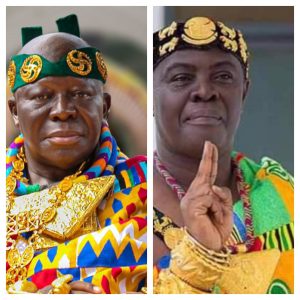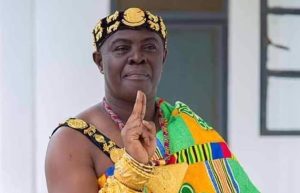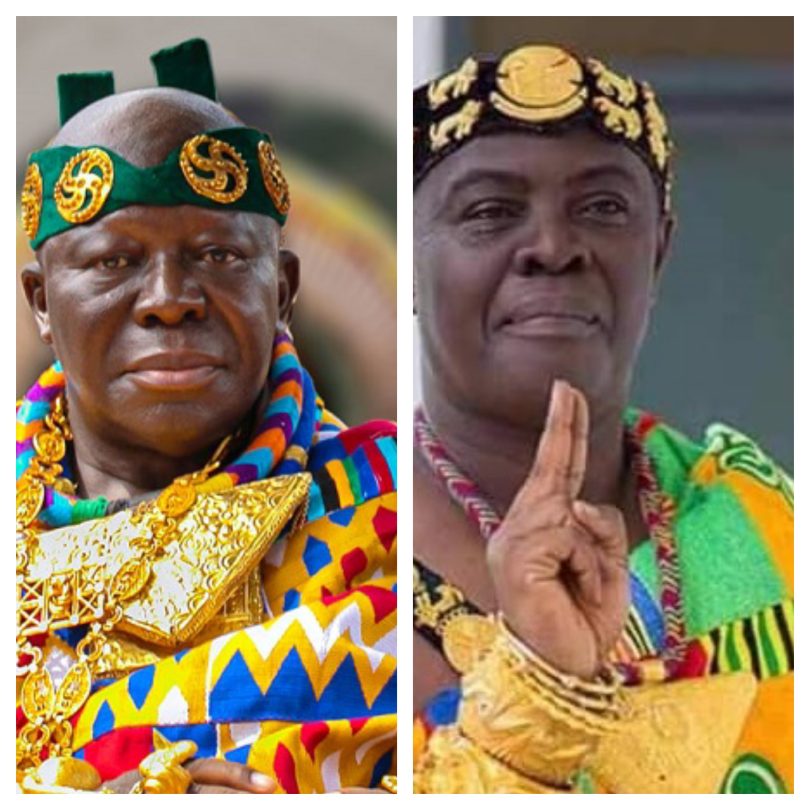
Asantehene and Dormaahene
Source: GraphicOnline
The Asantehene, Otumfuo Osei Tutu II has replied the Dormaa chief, Oseadeayo Agyeman Badu II on his recent pronouncements about the powers of the Asantehene and his ability to elevate chiefs to the status of paramountcy.
At an Asanteman Council meeting at the Manhyia Palace in Kumasi on Thursday [October 19, 2023], the Asantehene once again recounted the history of how the Dormaa stool was elevated to the status of a paramount chief by an Asantehene.
Repeating what he had earlier said in line with history, especially on how Asanteman was established in relation to the Golden Stool and the allegiance paid by all chiefs in the Asanteman Kingdom, Otumfuo said he has been compelled to offer the explanation once again because of a recent attempt to try and distort history.
Asantehene elevated Dormaa stool
Otumfuo Osei Tutu II said it was his uncle, the then Asantehene, who even elevated the status of the Dormaa stool to the level of a paramount chief.
He added that, even before Agyeman Badu [the first] was enstooled as Dormaa chief, he Agyeman Badu I, an uncle of the current Dormaa chief [Agyeman Badu II], swore the oath of allegiance to the Asantehene.

Dormaahene, Osagyefo Oseadeayo Agyeman Badu II
What Dormaahene said
In a recent video interview with Ghanaweb, the current Dormaahene, Osagyefo Oseadeayo Agyeman Badu II, who is also a High Court judge raised issues with how the Asantehene elevates chiefs to the status of paramountcy and also said there was “no King in Ghana” as the 1992 constitution does not make any reference and room for that.
He said it is in areas like Morocco and Saudi Arabia, where they have Kings and heads of those countries, and that, at those places the constitution recognises that there is a Kingdom, but in Ghana, the constitution does not talk about any Kingdom and therefore there is “no King” in Ghana.
It is the argument of the Dormaahene that, since Ghana was a state, there was no Kingdom within Ghana for the Asantehene to be referred to as a King.
In that Ghanaweb interview, Osagyefo Oseadeayo Agyeman Badu II suggested that the mention and reference to the Asantehene in the Chieftaincy Act, was not proper and that as part of a proposal to amend the Chieftaincy Act, he, together with others, will lead a campaign for the Asantehene’s name to be removed from the Chieftaincy Act.
He said if that was not done, it will mean other chiefs, such as the Ya Naa, Nayiri and others, would also have to be mentioned in the Chieftaincy Act.
This, is not the first time, the Dormaahene was raising such an argument but he has raised it at a number of public forums and in media interviews.
He had contested the extent of the Asantehene’s control over certain paramount chiefs whose jurisdiction falls within the political and governmental demarcated areas fall in other areas apart from the Ashanti Region, such as in the Bono, Bono East, Ahafo, Western and Oti regions.
The Dormaahene, Oseadeayo Agyeman Badu II, is currently the President of the Bono Regional House of Chiefs which is a gathering of paramount chiefs in the Bono Region.
To the Dormaahene, he does not understand why the Asantehene should have control and elevate certain chiefs to the status of paramount chiefs for them to be able to become members of the Bono Regional House of Chiefs or the Bono East Regional House of Chiefs.
He argues that, increasing the number of chiefs at the Regional House of Chiefs contributes to increasing government’s expenditure on the various regional houses of chiefs.
If every chief decides to elevate others to the level of paramountcy as the Asantehene is seeking to do, government’s expenditure will continue to increase, the Dormaahene said in the Ghanaweb interview, monitored by Graphic Online.
Source: www.graphic.com.gh








